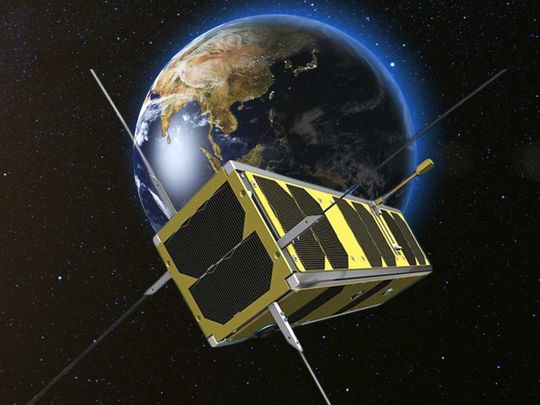Dubai: MeznSat, the UAE’s first environmental nano-satellite built by students, has successfully sent its first decoded signal to the satellite’s ground station at American University in Ras Al-Khaimah (AURAK) at 1.41am (UAE time) on Tuesday, following its successful launch on Monday afternoon from Plesetsk Cosmodrome in Russia.
Dr Abdel Halim Jallad, supervisor of MeznSat project at AURAK, said in a statement sent to Gulf News: “We are very pleased with our success in receiving the first signal from the satellite during its passage through UAE airspace early this (Tuesday) morning. As per the first signs, the satellite is in good condition and the batteries are well charged.”
See more
- In Pictures: UAE Team Emirates’ Tadej Pogacar spot on in Tour de France
- More COVID-19 rapid screening centres opened with Dhs50 per test
- UAE-Israel peace deal signing ceremony in pictures
- News in pictures: Amazon to hire 100,000 people, Kerala gold smuggling, Sally to hit Mexico, Russia vaccine, UAE mid-day break, Delhi COVID tests…
The signal is an indication that the miniature satellite — built to study climate change, detect greenhouse gas concentrations in the Arabian Gulf region — is “healthy and alive”.
Dr Jallad continued: “We have also succeeded in transmitting back a signal that the satellite successfully received and acknowledged. This is an encouraging indicator that the satellite is progressing on its mission. The passage of the satellite today in UAE’s airspace was successful.”
The team at AURAK is expecting to get the next signal from MeznSat on Wednesday afternoon during its next orbital passage. They will then get more information and move forward to the next and most important stage, which is the commissioning of rotation and ensuring the stability of the satellite’s orbit and angular speed.
Three-year mission
MeznSat, a three-unit CubeSat, was successfully launched on Monday at 3.20pm (UAE time) aboard a Russian Soyuz 2.1b rocket from Plesetsk Cosmodrome, a Russian spaceport located 800km north of Moscow.
Three-unit CubeSat, measuring 10X10X30cm with a 2.7kg payload (including an infrared spectrometer and RGB camera), will orbit the Earth 565km above sea level on a mission expected to last three years.
Read more
The ground station at AURAK, manned by its students, will monitor the satellite’s movements, collect data and analyse them in cooperation with UAE Space Agency and Khalifa University of Science and Technology (KUST). The AURAK satellite ground station is also designed to communicate with other satellites in the orbit.
Its mission is to enrich scientific research and boost space-related activities while studying greenhouse gases and the red tide phenomenon in the UAE. Specifically, MeznSat will study methane and carbon dioxide concentrations in the atmosphere.
Student-led project
Dr Jallad said: “The satellite was completely designed and manufactured by students from AURAK, who prepared the ground station as well, developed a work plan and manufactured all the parts of the satellite — including the special camera and receiving station. This MeznSat project has been a journey for the students, both in an educational sense and in terms of their own personal development, and I know that each of them will go on to achieve their career goals, as they are an intelligent and hard-working group. The project looks to support young Emiratis in developing the skill-sets that are necessary for the UAE’s ambitious National Space Programme and its future projects.”

